BMW X2 VS Toyota Yaris – Specs, Efficiency & Price Comparison
Which model is the better choice – the BMW X2 or the Toyota Yaris? We compare performance (300 HP vs 280 HP), boot capacity (560 L vs 286 L), efficiency (4.50 L vs 3.80 L), and of course, the price (41200 £ vs 21900 £).
Find out now which car fits your needs better!
The BMW X2 (SUV) is powered by a Diesel MHEV, Petrol MHEV, Diesel or Petrol engine and comes with a Automatic transmission. In comparison, the Toyota Yaris (Hatchback) features a Full Hybrid or Petrol engine and a Automatic or Manuel gearbox.
When it comes to boot capacity, the BMW X2 offers 560 L, while the Toyota Yaris provides 286 L – depending on what matters most to you. If you’re looking for more power, you’ll need to decide whether the 300 HP of the BMW X2 or the 280 HP of the Toyota Yaris suits your needs better.
There are also differences in efficiency: 4.50 L vs 3.80 L. In terms of price, the BMW X2 starts at 41200 £, while the Toyota Yaris is available from 21900 £.
Compare all the key specs now and find out which model fits your lifestyle best!
BMW X2
The BMW X2 is a striking blend of sporty design and urban versatility, appealing to those who seek both style and performance. Its dynamic driving experience is complemented by a high-quality interior, offering a plush and comfortable ride for both driver and passengers. The vehicle stands out in its segment with its bold aesthetics and innovative features, ensuring it captures attention on any city street.
details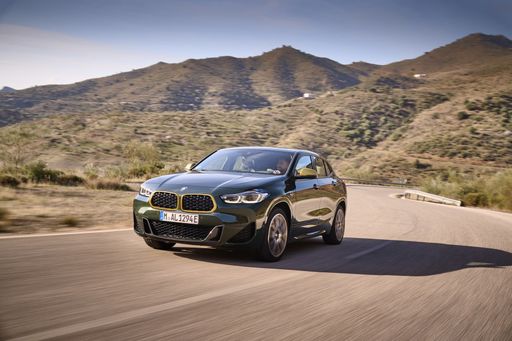 @ press.bmwgroup.com
@ press.bmwgroup.com
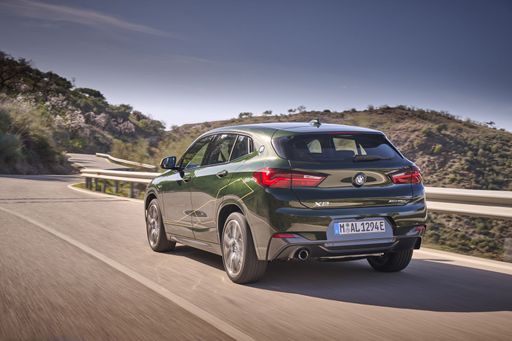 @ press.bmwgroup.com
@ press.bmwgroup.com
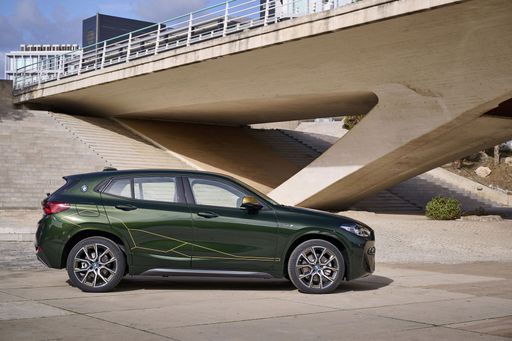 @ press.bmwgroup.com
@ press.bmwgroup.com
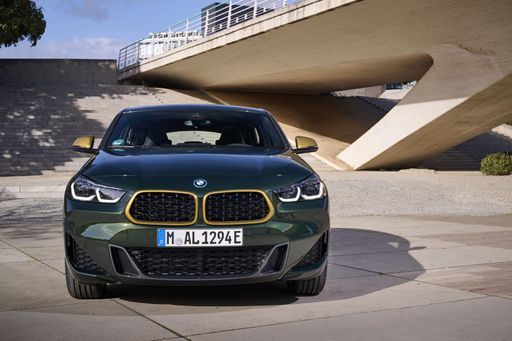 @ press.bmwgroup.com
@ press.bmwgroup.com
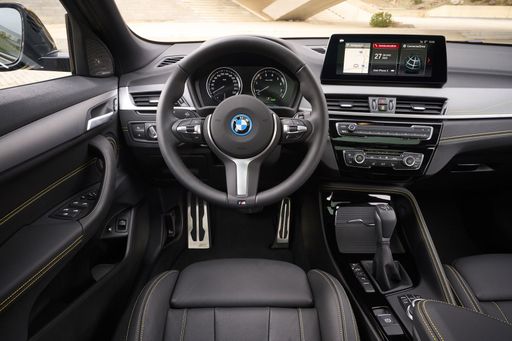 @ press.bmwgroup.com
@ press.bmwgroup.com
Toyota Yaris
The Toyota Yaris exudes a charming blend of practicality and style, making it an appealing choice for urban drivers. Its compact design allows for easy manoeuvrability in crowded city streets, while the interior offers a surprisingly spacious and comfortable environment. With a focus on fuel efficiency and reliability, the Yaris remains a popular option for those seeking a balance between performance and economy.
details @ Toyota
@ Toyota
 @ Toyota
@ Toyota

|

|
|
|
|
Costs and Consumption |
|
|---|---|
|
Price
41200 - 58900 £
|
Price
21900 - 45000 £
|
|
Consumption L/100km
4.5 - 7.7 L
|
Consumption L/100km
3.8 - 9.5 L
|
|
Consumption kWh/100km
-
|
Consumption kWh/100km
-
|
|
Electric Range
-
|
Electric Range
-
|
|
Battery Capacity
-
|
Battery Capacity
-
|
|
co2
118 - 175 g/km
|
co2
87 - 215 g/km
|
|
Fuel tank capacity
45 - 54 L
|
Fuel tank capacity
36 - 50 L
|
Dimensions and Body |
|
|---|---|
|
Body Type
SUV
|
Body Type
Hatchback
|
|
Seats
5
|
Seats
4 - 5
|
|
Doors
5
|
Doors
3 - 5
|
|
Curb weight
1645 - 1780 kg
|
Curb weight
1090 - 1356 kg
|
|
Trunk capacity
515 - 560 L
|
Trunk capacity
141 - 286 L
|
|
Length
4554 - 4567 mm
|
Length
3940 - 3995 mm
|
|
Width
1845 mm
|
Width
1745 - 1805 mm
|
|
Height
1575 - 1590 mm
|
Height
1455 - 1500 mm
|
|
Payload
495 - 510 kg
|
Payload
289 - 525 kg
|
Engine and Performance |
|
|---|---|
|
Engine Type
Diesel MHEV, Petrol MHEV, Diesel, Petrol
|
Engine Type
Full Hybrid, Petrol
|
|
Transmission
Automatic
|
Transmission
Automatic, Manuel
|
|
Transmission Detail
Automat. Schaltgetriebe (Doppelkupplung)
|
Transmission Detail
Schaltgetriebe, Automatikgetriebe
|
|
Drive Type
Front-Wheel Drive, All-Wheel Drive
|
Drive Type
Front-Wheel Drive, All-Wheel Drive
|
|
Power HP
150 - 300 HP
|
Power HP
116 - 280 HP
|
|
Acceleration 0-100km/h
5.4 - 8.9 s
|
Acceleration 0-100km/h
5.5 - 9.7 s
|
|
Max Speed
207 - 250 km/h
|
Max Speed
175 - 230 km/h
|
|
Torque
280 - 400 Nm
|
Torque
390 Nm
|
|
Number of Cylinders
3 - 4
|
Number of Cylinders
3
|
|
Power kW
110 - 221 kW
|
Power kW
85 - 206 kW
|
|
Engine capacity
1499 - 1998 cm3
|
Engine capacity
1490 - 1618 cm3
|
General |
|
|---|---|
|
Model Year
2024
|
Model Year
2024 - 2025
|
|
CO2 Efficiency Class
D, F
|
CO2 Efficiency Class
B, G
|
|
Brand
BMW
|
Brand
Toyota
|
BMW X2
The BMW X2: Where Innovation Meets Performance
The BMW X2 stands out in the automotive world as an embodiment of both dynamism and style. This compact SUV offers not just the aesthetic appeal but also an impressive array of technical prowess and advanced innovations. As we delve into the details of the X2, a glimpse at its features reveals a perfect blend of BMW's celebrated engineering and cutting-edge technology.
Engine and Performance
Under the hood, the BMW X2 showcases a range of powertrains from Diesel and Diesel Mild-Hybrid to Petrol Mild-Hybrid options. The power output ranges from 150 to 300 PS, ensuring that there is a variant to suit both urban driving and those with a penchant for speed. Notably, the M35i Petrol Automatic variant with all-wheel drive reaches a formidable 300 PS. These engines deliver not only power but also remarkable efficiency, boasting fuel consumption figures between 4.6 and 7.9 L/100km.
Innovative Transmission
The X2 employs a sophisticated automatic transmission system, specifically the double-clutch transmission, known for its smooth and efficient gear shifting. This technology not only enhances performance but also contributes to a more enjoyable driving experience by ensuring that power is always delivered seamlessly.
Modern Drivetrain Architecture
Front-wheel and all-wheel-drive options are available in the X2 lineup. The xDrive technology on certain models provides an intelligent all-wheel-drive system that adapts to various driving conditions, offering superior traction and stability. This makes it an ideal choice for drivers seeking both everyday usability and adventurous off-road capability.
Design and Dimensions
At first glance, the BMW X2 boasts a distinct sporty silhouette. Its dimensions, with a length ranging from 4554 to 4567 mm, and a consistent width of 1845 mm, create a bold and commanding presence on the road. The height, between 1575 and 1590 mm, ensures a comfortable cabin space, whilst the five-door configuration allows for practical accessibility.
Interior and Comfort
Inside, the X2 offers a luxurious yet functional interior. With seating for five, the cabin is designed for comfort and ergonomics, promising a pleasurable driving experience. The boot capacity ranges from 515 to 560 litres, providing ample space for luggage and daily necessities. With various trim levels, including the M Sport package, drivers can opt for features that enhance both aesthetics and driving dynamics.
Sustainability and Efficiency
In an era where environmental consciousness is paramount, the X2 impresses with its CO2 efficiency, classified between D and G. This SUV not only meets performance expectations but also aligns with modern sustainability standards, boasting CO2 emissions ranging from 120 to 179 g/km.
Conclusion: Innovation in a Compact SUV
The BMW X2 remains a testament to BMW's commitment to innovation and excellence. By blending a sleek design with high-performance features and advanced technology, the X2 provides an engaging and efficient driving experience. Whether navigating city streets or embarking on open-road adventures, the X2 proves to be a versatile and attractive choice for discerning drivers.
Toyota Yaris
Introducing the Next-Gen Toyota Yaris: A Blend of Innovation and Technology
The Toyota Yaris has long been lauded for its efficiency, reliability, and practicality. As we venture into the 2024 model year, Toyota has upped the ante with the latest versions of this popular hatchback, melding cutting-edge technology with eco-conscious design. Here’s an in-depth look at what makes the current Yaris line-up stand out from the crowd.
Efficient Powertrains: Hybrid and Beyond
Spearheading the technological innovation in the Yaris range is the introduction of various hybrid models. The Yaris offers a 1.5-litre full-hybrid engine, marrying a petrol engine with an electric motor to produce between 116 and 130 PS. This power blend is controlled via a sophisticated CVT-gearbox, optimizing both performance and fuel efficiency, with consumption figures ranging from an impressive 3.8 to 4.2 litres per 100 km.
For those seeking pure performance, the GR Yaris variants provide a turbocharged 1.6-litre engine capable of producing 280 PS. This power is delivered via a choice of manual or automatic transmission, giving drivers the tactile involvement or convenience they desire.
Design that Fulfils and Inspires
The Yaris hasn't forgotten its roots as a compact, city-friendly hatchback, measuring between 3,940 and 3,995 mm in length. With its bold front grille, sleek lines, and a choice of striking colours, it's a car that turns heads while remaining perfectly suited for urban environments.
The interior is equally impressive, designed with a focus on driver convenience and comfort. Depending on the variant, Yaris can offer generous cargo space of up to 286 litres, making it a perfect companion for everyday tasks or weekend escapes.
Technological Integration: The Smart Choice
Toyota's approach goes beyond just improving engine technology; the Yaris is packed with innovative features aimed at enhancing the driving experience. It boasts a suite of advanced safety systems such as lane departure alert, pre-collision system, and adaptive cruise control, ensuring peace of mind on the road.
The infotainment system in the Yaris is designed to keep you connected, offering seamless smartphone integration, a user-friendly interface, and an intuitive navigation system, ensuring that you're always informed and entertained.
The Cost of Innovation
Owning a Yaris is not just about impressive technology; it's also about making economic sense. With a price range between €25,500 and €49,990, and monthly costs spanning from €748 to €1,513, it offers a broad spectrum to suit different budget needs.
Concerned about emissions? You can rest easy knowing that the Yaris boasts a CO2 efficiency class ranging from B to G, thanks to its low emissions output of between 87 to 215 g/km.
Conclusion: The Toyota Yaris Drives the Future
The Toyota Yaris continues to be a strong contender in the compact car segment, pushing boundaries with its innovative full-hybrid systems and performance-oriented GR models. It's a remarkable blend of design, technology, and economy, ensuring it remains a top choice for drivers who demand more from their hatchbacks.
Whether you're seeking the efficiency of a hybrid or the thrill of the GR Yaris, there's a model tailored to your unique driving needs in Toyota's latest Yaris lineup.
The prices and data displayed are estimates based on German list prices and may vary by country. This information is not legally binding.
